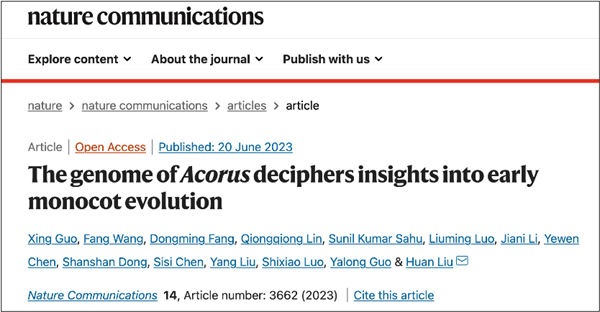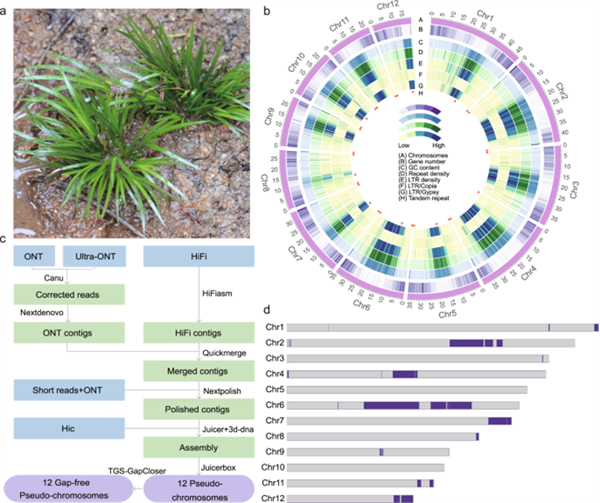Decoding the Genome of Acorus Sheds Light on Early Monocot Evolution and Wetland Plant Adaptations
In a recent study published in Nature Communications, BGI-Research has reported a significant breakthrough in advancing our knowledge of the early evolution of monocot plants and genomic footprints of wetland plant adaptations.

The research, titled "The genome of Acorus deciphers insights into early monocot evolution," was published in Nature Communications.
By utilizing multiple sequencing platforms, the research team constructed a high-quality genome assembly of Acorus (A. gramineus). The analysis revealed that Acorus belongs to the order Acorales, which is the sister to the other existing monocot plants.
Monocot plants, which originated 136-140 million years ago, as the second-largest group of angiosperms, with over 85,000 species across 77 families. They have diversified and adapted to a wide range of terrestrial and aquatic habitats, making up approximately 21% of all angiosperm species. Their impressive morphological diversity is crucial as they directly or indirectly contribute to the majority of human diets. Commonly known monocot plants include important crops such as rice, wheat, and maize.

Morphology and genomic architecture of A. gramineus.
The researchers employed ultra-long-read sequencing techniques to assemble a massive mitochondrial genome sequence, one of the largest reported in monocots to date. The analysis showed a remarkably high mutation rate, which is likely the cause of gene tree incongruence between nuclear and mitochondrial genomes. This finding provides an explanation for the inconsistencies in previous mitochondrial analyses.
Whole-genome duplication (WGD) events have played a crucial role in plant evolution. Previous research has indicated that all monocot lineages, except for the Alismatales and Acorales, experienced a WGD event referred to as "τ" (pronounced tau). By analyzing and comparing the data, the researchers discovered that Acorales, represented by Acorus, did not undergo the τ event but instead experienced a lineage-specific WGD event. This finding offers a valuable model for understanding the ancestral state of monocot lineages.
Furthermore, through the identification of genes associated with aquatic adaptation, the researchers inferred that Acorus had undergone evolutionary changes to adapt to its wetland habitats, such as wetlands and marshes. These findings enhance our understanding of the genomic evolution of monocot plants and the adaptive mechanisms of wetland species, as well as provide new insights into the adaptation of important crops like rice to aquatic environments.
Read more about the research: https://www.nature.com/articles/s41467-023-38836-4

 Login
Login Login
Login CCCEU and Gunnercooke Successfully Host Webinar on CSDDD and FLR Compliance to Guide Chinese Businesses
CCCEU and Gunnercooke Successfully Host Webinar on CSDDD and FLR Compliance to Guide Chinese Businesses Cultivating responsible China-EU business leaders essential to tackling global challenges
Cultivating responsible China-EU business leaders essential to tackling global challenges



